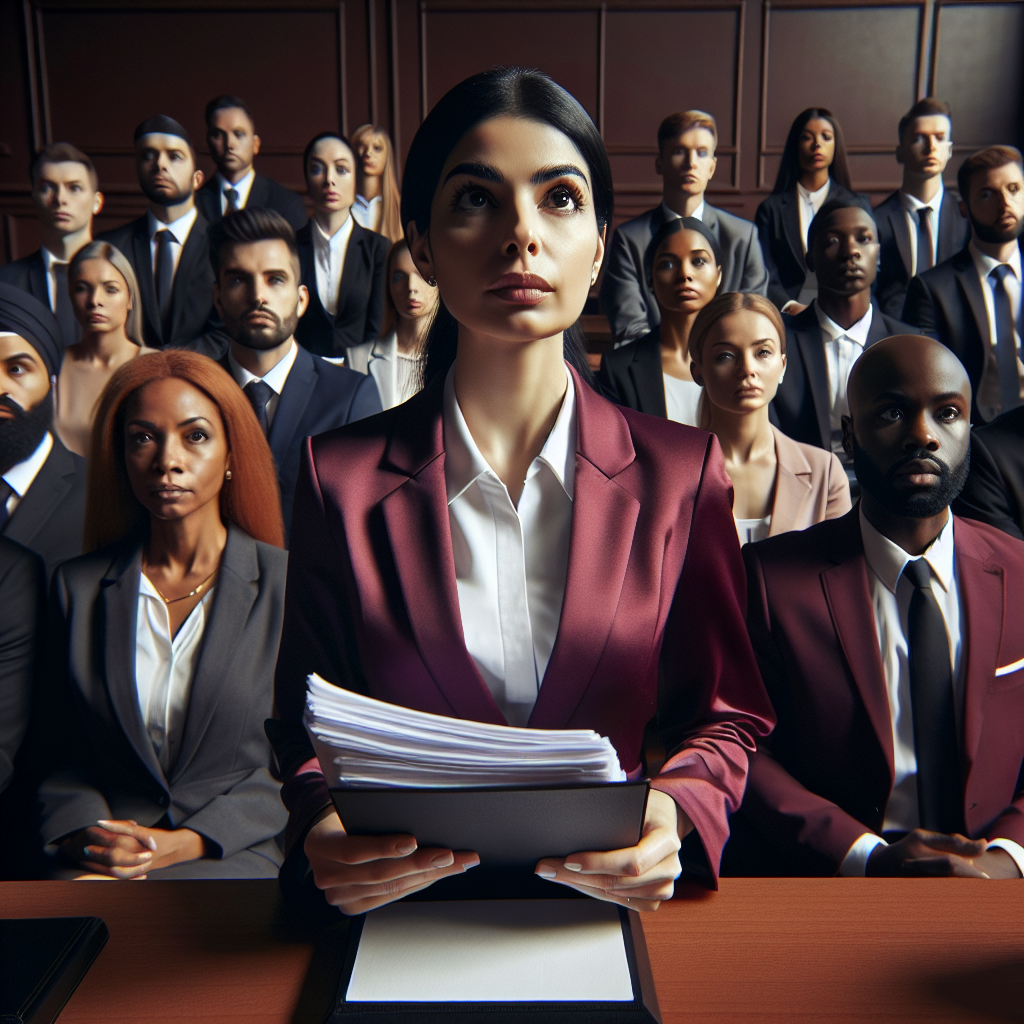
Introduction
When standing before a jury, every word matters, every gesture counts, and every strategy is finely tuned to sway the minds of those who ultimately hold a person’s fate in their hands. For many legal professionals, the anxiety and gravity of each courtroom encounter can be overwhelming. This is where the crucial but often overlooked element of legal success comes into play: consultation. In this article, we’ll explore why, in the arena of trial law, facing the jury involves more than just a strong case—it’s about the essential role of consultation in trial success.
Whether you are a seasoned attorney, a new legal practitioner, or someone simply interested in the mechanics of law, understanding the interplay between consultation and trial success is paramount. The nuances of consultation—be it with clients, experts, or peers—can dramatically influence outcomes and set the stage for what happens in that decisive moment when the jury decides.
The Consultation Framework: Building Blocks for Success
Understanding the Consultation Process
Successful trial strategies aren’t born in isolation; they are developed through discussion, feedback, and collaboration. Consultative practices involve deeper dialogues that do more than craft arguments—they empower lawyers to refine their strategies based on collective wisdom.
In this section, we will define what effective consultation looks like and why it is fundamental.
The Anatomy of Effective Consultation
- Identifying the Right Stakeholders: Knowing whom to consult—whether it be clients, subject-matter experts, or fellow attorneys—can tailor your approach.
- Active Listening: Taking the time to truly understand the perspectives of others can lead to valuable insights.
- Feedback Loops: Establish mechanisms for ongoing feedback to adapt strategies quickly.
Case Study: The Defense of John Doe
In 2016, John Doe was accused of a serious crime, which could have led to a lengthy prison sentence. His legal team prioritized consultation with forensic experts and psychologists, seeking different perspectives on how to present Doe’s psychological state during the trial. This collaborative effort ultimately led to a more nuanced narrative that helped shape the jury’s understanding, resulting in a reduced sentence.
Analysis
The case of John Doe illustrates how consultation can alter the trajectory of a trial. By integrating expert insight, the defense successfully created a multifaceted argument that resonated more with the jury, showcasing the essential role of consultation in trial success. The team’s ability to consult varied experts demonstrated that even the most challenging cases can benefit from collective intelligence.
The Role of Expert Consultation
Why Involve Experts?
When facing the jury, having a solid legal foundation is essential; however, it’s often not enough. The layers of complexity in most cases—scientific, technical, psychological—warrant consultation with experts who can clarify, justify, and humanize elements of the case.
Types of Expert Consultations
| Type of Expert | Role |
|---|---|
| Forensic Analysts | Provide evidence interpretation |
| Psychologists | Offer insight into mental state perspectives |
| Financial Experts | Analyze financial statements when relevant |
Case Study: The Financial Fraud Case
In a high-stakes financial fraud case in 2019, the prosecution faced challenges while presenting intricate financial data to the jury. After consulting a prominent forensic accountant, they were able to distill complex numbers into compelling visuals that were understandable.
Analysis
This example underscores the essential role of consultation in trial success. The jurors, who might have found the financial maneuvering bewildering, were able to follow along, appreciate the fraud’s implications, and ultimately reach a verdict aligned with the presented evidence.
Client Consultation: A Vital Necessity
The Client’s Perspective
Understanding the client’s viewpoint isn’t merely about gathering information; it’s about learning the emotional and psychological aspects that inform case details.
Communication Strategies
- Building Trust: Use transparent communication methods to foster a long-lasting relationship.
- Expectation Management: Set realistic timelines and clarify potential outcomes.
Case Study: The Family Law Case
In a contentious family law case, an attorney took the time to consult deeply with both parties involved, ensuring all voices were heard. By doing so, they were able to mediate the disagreements efficiently before they even reached the jury, ultimately avoiding public confrontation.
Analysis
This highlights the importance of client consultation. The attorney’s adept handling of the situation not only saved precious courtroom time but also showcased a successful method of avoiding unnecessary escalation. Facing the jury need not be the final step in a legal battle; sometimes, consultation can resolve disputes before they even begin.
Strategic Peer Consultation
Leveraging Collective Expertise
Consultation extends beyond clients and experts. Peer consultation—harnessing the experiences and insights of fellow attorneys—creates a richer understanding of legal strategies.
Benefits of Peer Consultation
- Diverse Perspectives: Different legal minds can bring unique viewpoints to a case.
- Shared Resources: Collaborating often provides access to resources or information that might otherwise remain inaccessible.
Case Study: The Collaborative Defense Team
In a criminal trial in 2020, a group of attorneys came together for a high-profile case. By consulting with one another, they shared insights on jury selection, presentation styles, and courtroom tactics. This collaborative approach ultimately led to a successful outcome, with the defendant acquitted of all charges.
Analysis
This showcases how facing the jury can be a more successful endeavor when a network of legal professionals collaborates. Knowing when to diversify advice often provides case strategies that one individual alone might overlook.
The Importance of Mock Trials
Testing Strategies with Consultation
Mock trials offer invaluable opportunities to test strategies before facing an actual jury. These rehearsals can be utilized to refine approaches based on feedback from peers, friends, or even family members acting as jurors.
Benefits of Mock Trials
- Trial Run for Attorneys: Allows for practice in a controlled environment.
- Feedback Gathering: Insight into how arguments may be interpreted by jurors.
Case Study: The Mock Trial Success
An attorney preparing for a sensitive trial involving allegations of harassment conducted a mock trial. The feedback collected highlighted areas of emotional appeal and concerns that could arise during jury deliberations.
Analysis
This preparation unearthed issues that could have jeopardized the case had they not been identified early. The success that followed in the actual trial stands as evidence of the essential role of consultation in trial success, where the feedback gathered made all the difference.
Essential Tools for Effective Consultation
Utilize Technology
In today’s digital age, leveraging technology can enhance consultation processes. Here are some essential tools:
| Tool | Application |
|---|---|
| Video Conferencing Software | Facilitates consultations with remote experts |
| Project Management Tools | Keeps consultations organized and trackable |
| Legal Analytics Software | Analyzes past cases to inform strategies |
The Advantages of Technological Facilitation
- Accessibility: Experts can be consulted from anywhere.
- Efficiency: Streamlined communication helps save valuable time.
Conclusion
Facing the jury is a daunting endeavor that requires more than just legal expertise; it necessitates a multifaceted approach involving extensive consultation. The key takeaways from this exploration include the vital roles of expert, client, and peer consultations, alongside innovative practices such as mock trials.
Trial success often hinges on one’s preparation, strategy, and adaptability, all of which are enriched by thoughtful consultations. For legal practitioners aiming for not just success but excellence, embracing this essential role of consultation could very well be the game-changer needed in today’s complex legal landscape.
FAQs
1. What is the primary purpose of consultation in trial preparation?
Consultation serves to refine strategies, gather diverse insights, and ultimately tailor arguments that resonate with jurors.
2. How can consultation improve communication with clients?
Effective consultation fosters trust and ensures clients feel heard, leading to clearer lines of communication and expectation-setting.
3. What role do experts play in the consultation process?
Experts provide specialized knowledge that can clarify complex aspects of a case, making it easier to present to jurors.
4. How can I implement mock trials into my preparation?
Organizing mock trials involves gathering peers to simulate real trial scenarios, allowing for feedback and refinement of your approach.
5. Is technology essential for consultations today?
While not absolutely necessary, technology significantly enhances the efficiency and accessibility of consultations, especially in our increasingly digital world.
This comprehensive exploration of Facing the Jury: The Essential Role of Consultation in Trial Success seeks to elevate your understanding and approach to trial law, ensuring you’re not just another lawyer in the courtroom but an innovator driven by insights and collaboration.

















